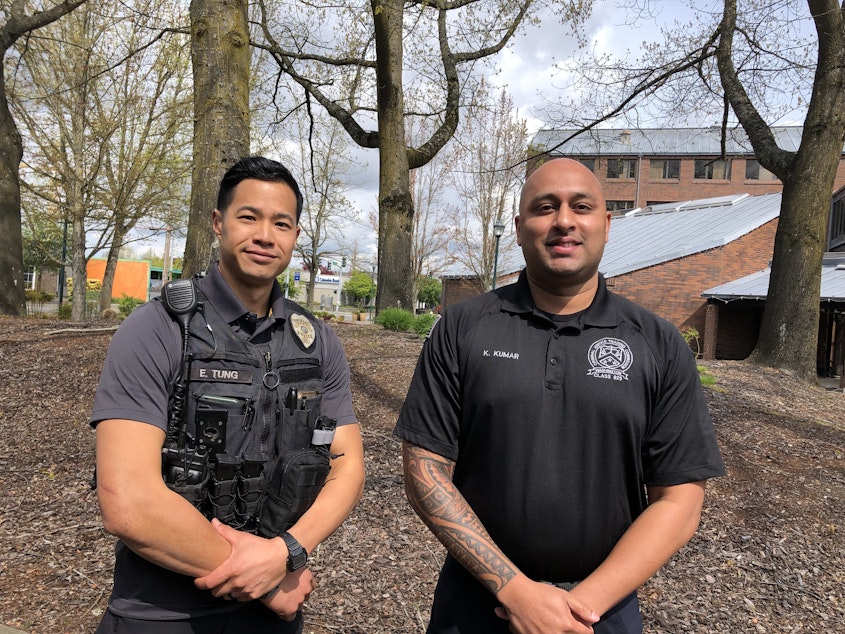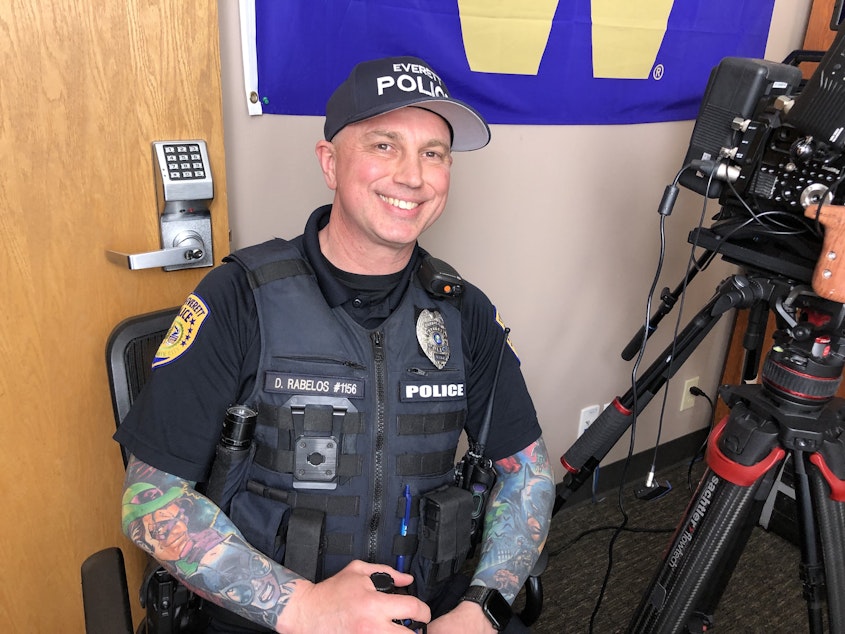SPD renews call for hiring incentives, as neighboring cities snap up recruits

Seattle’s police chief says the city is critically short on officers, and he thinks offering new hiring incentives would help. But critics say city funds can do more good by going directly to people in need.
Meanwhile, recruits in neighboring cities say incentives are important, but not the whole story.
Faith Kargopoltseva is a new recruit at the Everett Police Department. She’s expecting a baby, so she’s currently doing office work and will attend the police academy later this year. She’s also getting a degree in social work, which she expects to be useful in her job as a police officer.
“When I approach a call I want to be considered someone who’s safe, who is approachable, who people want to go to, to seek help with their problems,” she said. “Not someone to be in fear of because of a badge that I wear.”
Kargopoltseva said a few factors made her want to work for Everett PD. Officers here don’t have to patrol alone. The hiring process was fast, just two months. Everett is part of a national effort to recruit more women to policing. And the agency offers a targeted incentive for people with college degrees.
“I’ve been working really hard for my bachelor’s degree,” she said. “And thankfully I’m graduating in June. Then that 7% [salary increase] will kick in for me, which is a really nice bonus.”

Sponsored
So far this year, Everett has hired 15 new officers, with more offers pending, where Seattle has hired 13. Officer Danny Rabelos oversees Everett’s recruiting. He said one of his city’s selling points is a less contentious atmosphere around policing than say, the major city to the south.
“The biggest thing and draw to work for Everett is our community support, and the support of our leadership from the mayor all the way down,” Rabelos said.
Meanwhile, the city of Seattle has lost 43 officers so far this year. Police Chief Adrian Diaz told the City Council’s Public Safety Committee last week that his officers are being run ragged with overtime.
“What we’re going to do is create wear and tear on our officers,” he said. “It creates a whole host of not being able to deal with our own internal trauma, because we’re constantly going from call to call to call.”
Diaz said Seattle is pretty much alone in the region in not offering any current hiring incentives. He wants to draw on a projected $4 million in unspent salaries to create those incentives. Most agencies offer the most generous incentives to officers who transfer in-state, because recruitment and training of new recruits costs more than $100,000.
Sponsored
While Seattle has offered a signing bonus for new and experienced officers in the past, other cities have now gone beyond those to reward officers who have college degrees or are multilingual.
Krishan Kumar is a new police recruit for the city of Kent, southeast of Seattle. His salary included a bonus to reflect his language skills.
“I speak Hindi, I’m from Fiji so we speak a little different dialect called Fiji Hindi,” Kumar said.
He said another draw was Kent’s “community immersion program,” which gave him a paid internship to spend several weeks assisting refugees through the organization World Relief. Kumar said he focused on applying in Kent because he grew up nearby, and his mom and his brothers live there.
“I wanted to work in a city that I have personal ties to, and I wanted to work in a city that was super culturally diverse because that’s what I grew up around,” he said.
Sponsored
Kumar said the lack of a signing bonus was not really an issue — officers in Kent are among the highest paid in the state. (According to a report from the Seattle City Council central staff, the highest starting salaries for police officers in Washington are offered by Auburn, Seattle, Kennewick, and Kent.)
Sergeant Eric Tung is in charge of Kent’s recruiting efforts. He said the decision of where to work usually involves a lot of factors, and hiring bonuses on their own haven’t been that big of a draw.
“We find that most people don’t want to become a police officer for the pay," Tung said. "They don’t pursue policing for the paycheck. It’s more about purpose and impact.”

But supporters of community alternatives to policing in Seattle say they’re ramping up new systems to support youth and prevent violence. And they don’t want the city to backslide on those efforts.
Sponsored
Jess Rock is director of operations for Community Passageways. She said it’s disheartening to see the Seattle City Council contemplate more funding for police recruiting rather than community efforts.
“We do feel like we’re at the whim of tide changes happening pretty quickly,” she said.
The organization is part of a coalition that sends people to the scenes of gun violence and helps impacted families address needs from funeral expenses to utility bills.
Ben Kaplan also works for Community Passageways. He said this job is the first time he's actually had resources to offer people in need, like free counseling on demand.
“I’ve never been in a position where someone has said, ‘I need help, I need someone to talk to,’ and we’ve said, ‘Let me get you connected up,’” Kaplan said.
Sponsored
Sean Goode heads the group Choose 180, another partner in this coalition. He said SPD’s $4 million in unspent salaries could make a tremendous difference for families they work with. And he said SPD’s difficulty hiring may be about more than the lack of a signing bonus.
“It could very well be likely that people are hesitant to join a system of policing because they may not believe that that particular practice is the best way to keep the community safe,” he said.
Seattle offered signing bonuses twice in recent years, but those initiatives have expired. Seattle City Councilmember Sara Nelson has introduced a resolution to support new hiring incentives for police, which the Council could consider May 10. Nelson said she’s also in the process of drafting legislation. Councilmember Lisa Herbold said she’ll seek a limited incentive to cover moving expenses for new hires, and a recruiter position for SPD.




